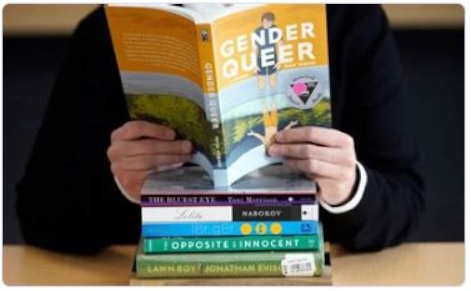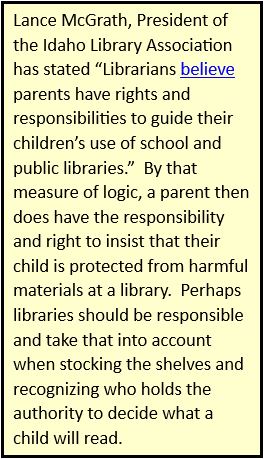
Libraries & The Legislature
By Karen Schumacher
In the last and current legislative sessions, the issue of access to certain books by minors continues to be at the forefront, with many in support of or in opposition to several bills.
 Current Idaho Statutes address the prohibition of obscene or indecent material, some including towards minors. Idaho Statute 23-614, Idaho Statute 18-4105, Idaho Statute 18-1513 and 18-1515 both added in 1972, and Idaho Statute 18-1507 all cover and describe what is considered indecent and obscene.
Current Idaho Statutes address the prohibition of obscene or indecent material, some including towards minors. Idaho Statute 23-614, Idaho Statute 18-4105, Idaho Statute 18-1513 and 18-1515 both added in 1972, and Idaho Statute 18-1507 all cover and describe what is considered indecent and obscene.
So here we have existing laws banning obscenity and indecency with descriptions on what it is, and with protections of minors in some cases Today, efforts are being made to include protections for children from obscenity and indecency in library materials, the internet, cell phones, and AI.
HB498 allows a civil remedy for parents and protection on the internet; SB1253 would require enabling filters and ability to remove detrimental content on devices; HB382 includes banning sexual exploitation of children via AI; HB384 restricts children’s access to obscene material in a library and allow civil action; SB1221 creates a procedural requirements for review, selection, and management of school library materials; and HB710 requires schools and libraries to restrict children access to obscene and harmful material and allows civil action. This bill is being held in the Senate State Affairs committee for further discussion.
What the heck happened in 52 years that now all of a sudden what was determined as indecent, obscene, and harmful for children has now become educational, beneficial, or even a free speech or constitutional issue?
Surely, every legislator who has been opposing these proposed bills would by contrast be an ardent supporter of each existing statute on obscenity and indecency. They would most likely never support the idea of such ribaldry in a public square, or facility. Would they support the exercise of this type of information in the streets, considering it a “free speech” right, or relabeling it art and of benefit to the masses?
One outspoken individual opposing these bills is Lance McGrath, President of the Idaho Library Association (ILA), and who uses this association as representative of his views.
In 2023 (McGrath) stated, “The government has a duty to protect its citizens – especially minors. But it cannot do so by infringing on the fundamental rights of free speech and access to constitutionally protected information.” That is an oxymoron. At that time he also stated, “Idaho libraries, whether school or public, do not provide materials that are harmful to minors.” If this were true there would currently not be such a brouhaha about protecting children on this issue.
Going further, Mr. McGrath has stated “Librarians believe parents have rights and responsibilities to guide their children’s use of school and public libraries.” By that measure of logic, a parent then does have the responsibility and right to insist that their child is protected from harmful materials at a library. Perhaps libraries should be responsible and take that into account when stocking the shelves and recognizing who holds the authority to decide what a child will read.
He reiterated the same this year and expressed concern that “The private right of action creates a bounty system that will place an incredible financial burden on libraries and open them up to serious actions and potential litigation.” The protection of the library is more important than a child? According to Mr. McGrath, “Freedom of intellectual pursuits is a fundamental American ideal and a human right.”
A minor reading sexually explicit material is an intellectual pursuit and a right? As an example of what he would consider an intellectual pursuit, here is an example of a banned book with a strong warning about the explicit graphics contained within it.
The Idaho Chapter of the American Library Association (ALA), supports McGrath’s stance on the idea that banning this type of material is a “threat to democracy” and likely violates its Library Bill of Rights.
Many engaged in this issue might be aware that libraries accepting federal funding may already be utilizing internet filtering systems. The 2000 Children’s Internet Protection Act (CIPA) provides funding for internet filtering mechanisms that can be disabled for adults on request. One focus of the law is safety policies addressing access, safety, and security of minors to inappropriate matter on the internet. Idaho Statute 33-2741 addresses this in Idaho libraries. Heck, if sexually explicit material is allowed on bookshelves, then the internet should be open access to minors as well! It seems illogical that protection from harm can be divided between different forms of information, maybe unless there is money involved.
Few studies could be found on what harm is caused to children who are exposed to explicit sexual material, however there are many studies on the effect it has on adolescents, especially related to the internet, and it is all negative. If an adolescent experiences adverse reactions, how can it be expected that a child won’t experience the same if not worse?
Just as a side note, the ILA is a chapter of the American Library Association (ALA) which is a member of the International Federation of Library Associations and Institutions (IFLA), a UN listed nongovernmental organization (NGO) that also supports a Public Library Manifesto with UNESCO. It should be of no surprise that ALA and IFLA both support the United Nations Sustainable Development Goals (SDG). Therefore, it should be no surprise that this type of material is very much integrated into the SDGs that filters down to libraries.
Okay, going with Mr. McGrath’s and reasoning by others who oppose these bills, free speech and access to Constitutionally protected material are both Constitutional rights. If these books were displayed, freely handed out, or even sold to children or adults by someone on the street or at a public venue, would those books violate current state law, especially 18-1507(j) and 18-1515?
If yes, then that material should not be made available in a library. If not, then it should be considered perfectly acceptable for these books to be handed out or sold at the next public event and current laws should be changed to remove all penalties for doing so. Perhaps reparations should be given to those who have been penalized under these laws for violation of their rights. Internet access should also be made available and the funding for filtering it should also be refused.
As the Senate State Affairs committee continues to discuss this issue, contact them at sstaf@senate.idaho.gov and let them know your thoughts because the opposition is strong right now.